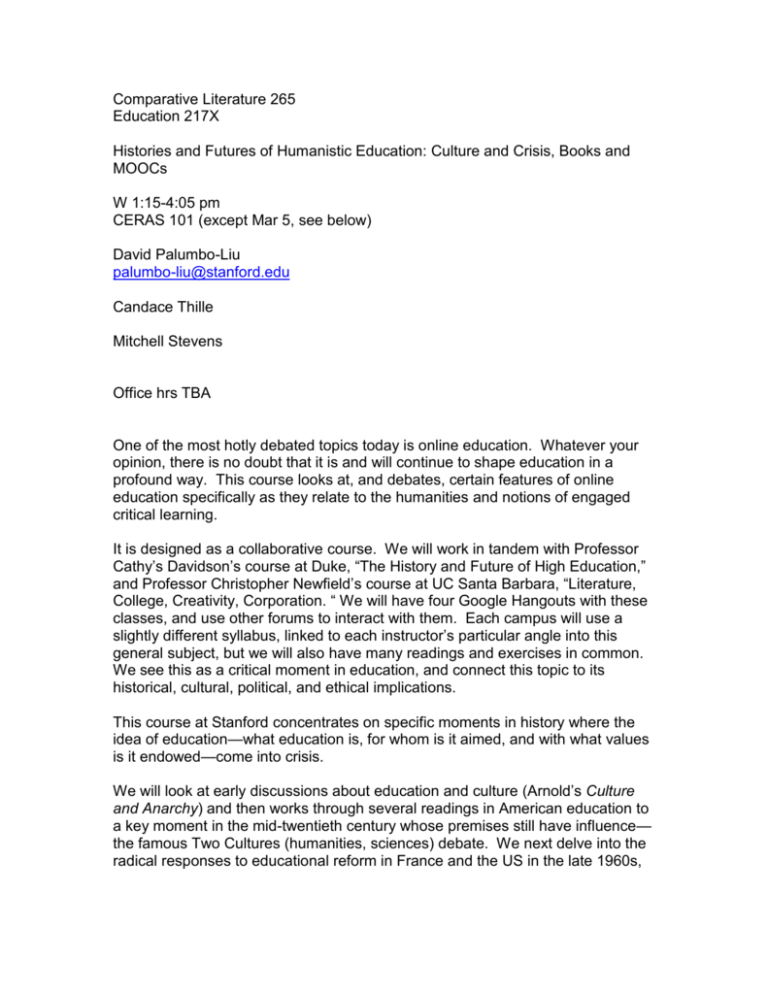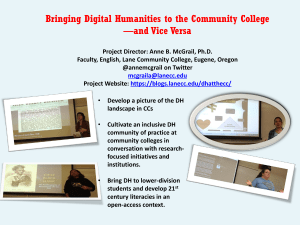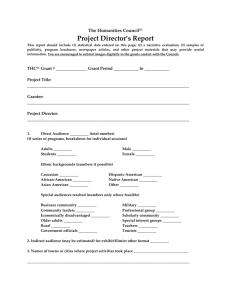Syllabus, Histories and Futures of Humanistic Education
advertisement

Comparative Literature 265 Education 217X Histories and Futures of Humanistic Education: Culture and Crisis, Books and MOOCs W 1:15-4:05 pm CERAS 101 (except Mar 5, see below) David Palumbo-Liu palumbo-liu@stanford.edu Candace Thille Mitchell Stevens Office hrs TBA One of the most hotly debated topics today is online education. Whatever your opinion, there is no doubt that it is and will continue to shape education in a profound way. This course looks at, and debates, certain features of online education specifically as they relate to the humanities and notions of engaged critical learning. It is designed as a collaborative course. We will work in tandem with Professor Cathy’s Davidson’s course at Duke, “The History and Future of High Education,” and Professor Christopher Newfield’s course at UC Santa Barbara, “Literature, College, Creativity, Corporation. “ We will have four Google Hangouts with these classes, and use other forums to interact with them. Each campus will use a slightly different syllabus, linked to each instructor’s particular angle into this general subject, but we will also have many readings and exercises in common. We see this as a critical moment in education, and connect this topic to its historical, cultural, political, and ethical implications. This course at Stanford concentrates on specific moments in history where the idea of education—what education is, for whom is it aimed, and with what values is it endowed—come into crisis. We will look at early discussions about education and culture (Arnold’s Culture and Anarchy) and then works through several readings in American education to a key moment in the mid-twentieth century whose premises still have influence— the famous Two Cultures (humanities, sciences) debate. We next delve into the radical responses to educational reform in France and the US in the late 1960s, and finally consider the changing state of funding, value, and cultural critique in the late twentieth and early-twenty-first century. In particular we examine the idea of education as a personal, collective, and intensely intellectual endeavor that is shaped by and shapes societies. We focus specifically on the idea of the “public good” and the relation between education and a democratic society. This is a first-time, experimental course that will rely heavily on student input, participation, invention, and dialog face-to-face and collaboration with students at Duke, UC Santa Barbara, and elsewhere. It meets once a week for three hours. Texts: 1940 AAUP Statement on Academic Freedom Matthew Arnold, Culture and Anarchy (“Introduction,” “Sweetness and Light,” “Barbarians, Philistines, Populace”). “Bill of Rights and Principles for Learning in a Digital Age”: http://www.hastac.org/forums/forum-bill-rights-and-principles-learning-digital-age Cathy Davidson, Now You See It! (Introduction and Chapter 3) Davidson, “How A Class Becomes a Community”: http://www.hastac.org/blogs/cathy-davidson/2013/08/01/chapter-one-how-classbecomes-community-theory-method-examples http://www.hastac.org/collections/field-notes-21st-century-literacies Cathy Davidson and David Theo Goldberg, The Future of Learning Institutions in a Digital Age Paulo Freire, Pedagogy of the Oppressed (Chapters 1, 2, 3) The G.I. Bill of 1944 Regenia Gagnier, “Operationalizing Hope: The Neoliberalization of British Universities” H. Giroux, Teachers as Intellectuals (Chapters 4, 6, 7, 8, 9, 13) Suzanne Guerlac, “Humanities 2.0: E-learning in the Digital World.” Geoffrey Galt Harpham, “From Eternity to Here: Shrinkage in American Thinking About Higher Education” Gregory Lee, “Tomorrow’s Humanities? Head in the Clouds, Back to the Future, Across the World.” Colleen Lye, Christopher Newfield, James Vernon, “Humanists and the Public University.” Kazuo Ishiguro, Never Let Me Go. The Morrill Acts of 1862 and 1890 Christopher Newfield, Unmaking the Public University (Chapters -18, 13, 15, Conclusion) Palumbo-Liu, The Deliverance of Others (Preface, Introduction, Chapter 3 [on Never Let Me Go]) -- “Introduction” to Occasion 6: Restructuring the Humanities. Report of the President's Commission on Higher Education in a Democracy in 1947 Howard Rheingold, Net Smart The “Nanterre Manifesto” The “Port Huron Statement” K Ross, May ’68 and Its After-lives (Introduction, Chapters 1 and 2) CP Snow, The Two Cultures The Booker T. Washington and W.E.B. Du Bois debate in the early 20th century The Yale Report of 1828 Materials on “Pre-Texts” (see pre-texts.org) Films: Jonas qui aura 25 ans en l’an 2000 (Jonah, who will be 25 in the year 2000). dir Tanner. Entre les murs (The Class). Dir. Cantet Schedule (Hangout dates are in brackets—be sure to attend!) 1/8 Introductions. Create teams. Choose biblio on MOOCs, join Fb group. 1/15 Arnold, Culture and Anarchy. The Yale Report of 1828, The Morrill Acts of 1862 and 1890, 1940 AAUP Statement on Academic Freedom, The G.I. Bill of 1944 and the Report of the President's Commission on Higher Education in a Democracy in 1947. CP Snow The Two Cultures, Palumbo-Liu, “Introduction” to Occasion 6: Restructuring the Humanities. Gagnier essay in Occasion; Harpham, “From Eternity to Here: Shrinkage in American Thinking About Higher Education.” [1/22] Readings, Newfield readings (Chapters 1-8, 13, 15, Conclusion), Lye, Newfield and Vernon on “Humanists and the Public University”; readings on MOOCs derived from 1/8. 1/29 The Booker T. Washington and W.E.B. Du Bois debate in the early 20th century, Freire, Giroux readings. Discussion of final assignment. [2/5] Davidson, Now You See It (“Introduction” and Chapter 3. Project Classroom Makeover”); “How a Class Becomes a Community” and “Rights and Principles” (to be found at http://www.hastac.org/collections/field-notes-21stcentury-literacies); Davidson and Goldberg, “The Future of Learning Institutions in a Digital Age.” 2/12 Ross (Introduction, Chapters 1, 2), Nanterre, Port Huron, “Jonas” (watch in class) 2/19 Watch “Entre les Murs,” Discussion. [2/26] P-L Intro, Chapter on Never Let Me Go, Never Let Me Go. Attend Doris Sommer lecture after at 5 pm [3/5] Net Smart, Pre-Texts. Suzanne Guerlac, “Humanities 2.0”; Gregory Lee, “Tomorrow’s Humanities?” Hangout with our partner classes as well as Prof. Howard Rheingold and Pre-Texts originator Prof. Doris Sommer. On this date alone we will meet 2-4, and in Hewlett 102. Please mark this on your calendars. [3/12] Closing--Synthesis








